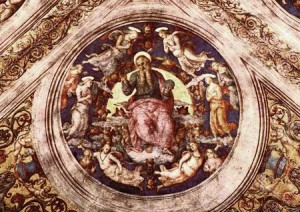 [1]An old adage tells us that theology is the queen of the sciences, philosophy her handmaid. This means not simply that heavenly wisdom is nobler or more edifying than earthly knowledge. It speaks also of the epistemological importance of the theistic conviction: objective reality depends upon the existence of the Supreme Subject.
[1]An old adage tells us that theology is the queen of the sciences, philosophy her handmaid. This means not simply that heavenly wisdom is nobler or more edifying than earthly knowledge. It speaks also of the epistemological importance of the theistic conviction: objective reality depends upon the existence of the Supreme Subject.
Philosophy, in the broadest sense of that word, be it hard (physics) or soft (ethics), is reliable only if we live in an intelligible universe. Intelligibility, of course, derives from a Being capable of thought.
The scientists of early modernity were sure that they could analyze and describe the natural world because of their faith in a meticulous Creator and faithful Sustainer “upholding all things by the Word of His power” (Hebrews 1:3). They took for granted the validity of logic because they knew the Logos, the Wisdom of God. As Solomon declared, “The fear of God is the beginning of knowledge” (Proverbs 1:7).
Thus the wicked irony of today’s God-loathing prophets of scientism: By denying the Deity, they destroy the very foundation of knowledge, which is His enduring and unchanging Reason. “He tells the number of the stars; He calls them all by their names. Great is our Lord, and of great power: His understanding is infinite” (Psalm 147:4-5).
What is philosophy but “thinking God’s thoughts after Him,” as Johannes Kepler is said to have exclaimed? Consider it: If there is no God, there is no objectivity. If there is no objectivity, just subjectivity, then true science becomes an impossibility. There is only descent into the anarchy of Human skepticism.
Scripture affirms from the very start God’s role as wise Creator. It portrays Him as an Artisan of titanic strength and vitality. “For, lo, He that forms the mountains, and creates the wind, and declares unto man what is His thought, that makes the morning darkness, and treads upon the high places of the earth: the LORD, the God of hosts, is His name” (Amos 3:4). He is the wondrous Designer, the loving Craftsman made known by His labor: “The heavens declare the glory of God; and the firmament shows His handiwork” (Psalm 19:1).
With the clear testimony of Scripture and the added confirmation of natural revelation, we may be certain that we truly dwell in the “cosmos”: a well-ordered system that works in predictable fashion thanks to Divine fidelity. “In the beginning, the Lord did His work of creation, and gave everything a place of its own. He arranged everything in an eternal order” (Sirach 16:26-27).
Ronald Knox once wrote:
There was a young man who said
“God
Must think it exceedingly odd
If he finds that this tree
Continues to be
When there’s no one about in the
Quad.”
“Dear Sir, your astonishment’s odd;
I am always about in the Quad
And that’s why this tree
Will continue to be
Since observed by . . . Yours faith-
Fully, God.”
This poem illustrates my original point regarding the intimate relationship between subjectivity and objectivity. It also reveals one of the beautiful truths of Christianity: We ultimately believe reality to be Personal (or, more properly, Tri-Personal).
Sirach tell us: “The sun giving light has looked upon all things, and full of the glory of the Lord is His work” (42:16). The natural order is a symbol of God’s inner nature: Its glory points to His glory and its reason points to His Reason. Not only is nature symbolic, it pulses with the very life of the Deity. It is infused with His nourishing power, which summons existence from dead and empty void, so that we can and must declare, “He is all” (Sirach 43:29).